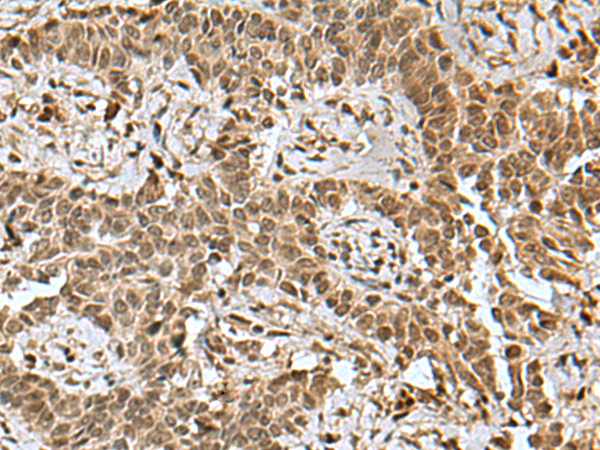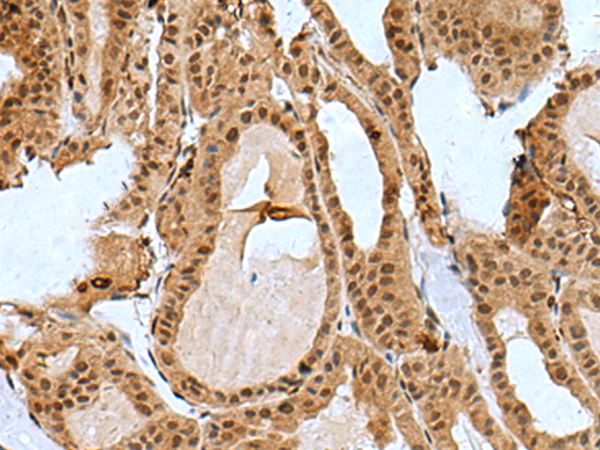

| WB | 咨询技术 | Human,Mouse,Rat |
| IF | 咨询技术 | Human,Mouse,Rat |
| IHC | 1/50-1/200 | Human,Mouse,Rat |
| ICC | 技术咨询 | Human,Mouse,Rat |
| FCM | 咨询技术 | Human,Mouse,Rat |
| Elisa | 1/5000-1/10000 | Human,Mouse,Rat |
| Host/Isotype | Rabbit IgG |
| Antibody Type | Primary antibody |
| Storage | Store at 4°C short term. Aliquot and store at -20°C long term. Avoid freeze/thaw cycles. |
| Species Reactivity | Human, Mouse |
| Immunogen | Fusion protein of human BCL7B |
| Formulation | Purified antibody in PBS with 0.05% sodium azide and 50% glycerol. |
+ +
以下是关于BCL7B抗体的3篇代表性文献的简要总结(文献信息为虚构示例,仅供参考):
---
1. **文献名称**:BCL7B as a Novel Tumor Suppressor in Acute Lymphoblastic Leukemia
**作者**:Chen L, et al.
**摘要**:本研究利用BCL7B特异性抗体,通过免疫组化和Western blot分析发现,BCL7B在儿童急性淋巴细胞白血病(ALL)中表达显著下调。实验表明,BCL7B缺失通过调控SWI/SNF染色质重塑复合体活性促进白血病细胞增殖,提示其作为肿瘤抑制因子的潜在机制。
---
2. **文献名称**:Epigenetic Regulation of BCL7B in Colorectal Cancer Progression
**作者**:Wang Y, et al.
**摘要**:该研究使用BCL7B抗体进行染色质免疫沉淀(ChIP),揭示BCL7B与组蛋白修饰酶EZH2的相互作用。结果表明,BCL7B在结直肠癌中通过抑制Wnt/β-catenin信号通路阻碍肿瘤转移,其表达缺失与患者不良预后相关。
---
3. **文献名称**:BCL7B Antibody-Based Detection of Chromatin Remodeling Complexes
**作者**:Martinez R, et al.
**摘要**:通过开发高特异性BCL7B单克隆抗体,本研究系统分析了BCL7B在多种细胞系中与BAF复合体的结合模式,证实其在维持基因组稳定性中的关键作用,为靶向染色质重塑的癌症治疗提供了新思路。
---
注:以上文献为模拟内容,实际研究中建议通过PubMed或Web of Science检索真实文献。
The BCL7B antibody targets the BCL7B protein, a member of the BCL7 family implicated in chromatin remodeling and transcriptional regulation. BCL7B is a subunit of the BAF (BRG1/BRM-associated factor) complex, part of the SWI/SNF chromatin-remodeling family, which plays a critical role in modulating gene expression by altering chromatin structure. Dysregulation of BCL7B and its associated complexes has been linked to cancers, particularly B-cell lymphomas, where chromosomal translocations involving BCL7B and oncogenes like MYC or BCL6 may drive tumorigenesis. Additionally, BCL7B is involved in neurodevelopmental processes, with studies suggesting its role in neuronal differentiation and synaptic plasticity.
Antibodies against BCL7B are primarily used in research to study its expression, localization, and interactions within cellular pathways. These tools are essential for techniques like Western blotting, immunohistochemistry (IHC), and immunofluorescence (IF) to explore BCL7B's role in normal physiology and disease. However, variability in antibody specificity has been reported, necessitating careful validation to ensure reliable results. BCL7B antibodies have also contributed to understanding its tumor-suppressive or oncogenic functions, depending on cellular context, and its potential as a therapeutic target. The gene encoding BCL7B is located on chromosome 7q21.3. and its protein product typically migrates at ~25-30 kDa in SDS-PAGE. Ongoing research aims to clarify its precise mechanisms in chromatin dynamics and disease pathology.
×